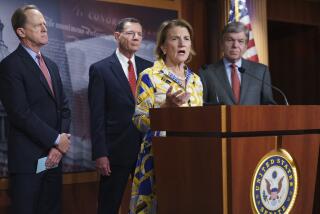Paying Less May Cost Taxpayers
- Share via
The Internal Revenue Service plans to start charging a “user fee” when economically troubled taxpayers ask to pay less tax than they owe through a so-called offer in compromise.
In proposed regulations issued Tuesday, the agency said taxpayers requesting an offer in compromise would have to pay a $150 fee. Taxpayers who earn less than the federal poverty guidelines -- that’s roughly $18,100 for a family of four -- would be exempted from the fee, as would those who join the program to settle a disputed debt.
The fee is aimed at discouraging frivolous offers and at recovering a portion of the cost of processing the compromise requests, which are submitted by roughly 125,000 taxpayers each year. The IRS says it costs $471 to $3,983 to process each such request.
“The fee is not intended to discourage taxpayers from filing good-faith offers,” said Bruce Friedland, an IRS spokesman in Washington. “But the IRS does expect that the fee will discourage inappropriate offers.”
The IRS estimates that 5% to 8% of the offers in compromise received each year are simply tactics aimed at stalling collection by the IRS.
The agency said only about half the requests received each year are processed. The rest either don’t include enough information or don’t meet the program’s criteria.
An offer in compromise is a formal program in which government officials consider whether an individual taxpayer will be allowed to settle a tax debt for less than what’s owed. Generally, the taxpayer must be willing to give up all of his or her assets to have an offer accepted, according to an IRS guide.
Agency statistics indicate that accepted offers allow taxpayers to settle their debts for 10 cents to 15 cents on the dollar owed.
Once a taxpayer submits an offer, the IRS suspends all efforts to collect the tax due until the offer has been formally accepted or rejected. The offers, which require significant verification of assets and income, can take years for the IRS to complete, said Philip J. Holthouse, partner with the Los Angeles tax law and accounting firm Holthouse Carlin & Van Trigt.
Still, some accountants were critical of the fee, mainly because it’s imposed on taxpayers who already are financially troubled.
“There is certainly a lot of irony here,” said Joe Parker, tax hotline coordinator at H&R; Block Inc. in Kansas City, Mo. “These are people who are saying, ‘I can’t afford to pay you.’ ” And the IRS is responding with, ‘We’ll talk about it after you give us $150.’ ”
Comments on the proposed rule will be accepted until Feb. 4. The IRS then will hold public hearings Feb. 13.
More to Read
Inside the business of entertainment
The Wide Shot brings you news, analysis and insights on everything from streaming wars to production — and what it all means for the future.
You may occasionally receive promotional content from the Los Angeles Times.









